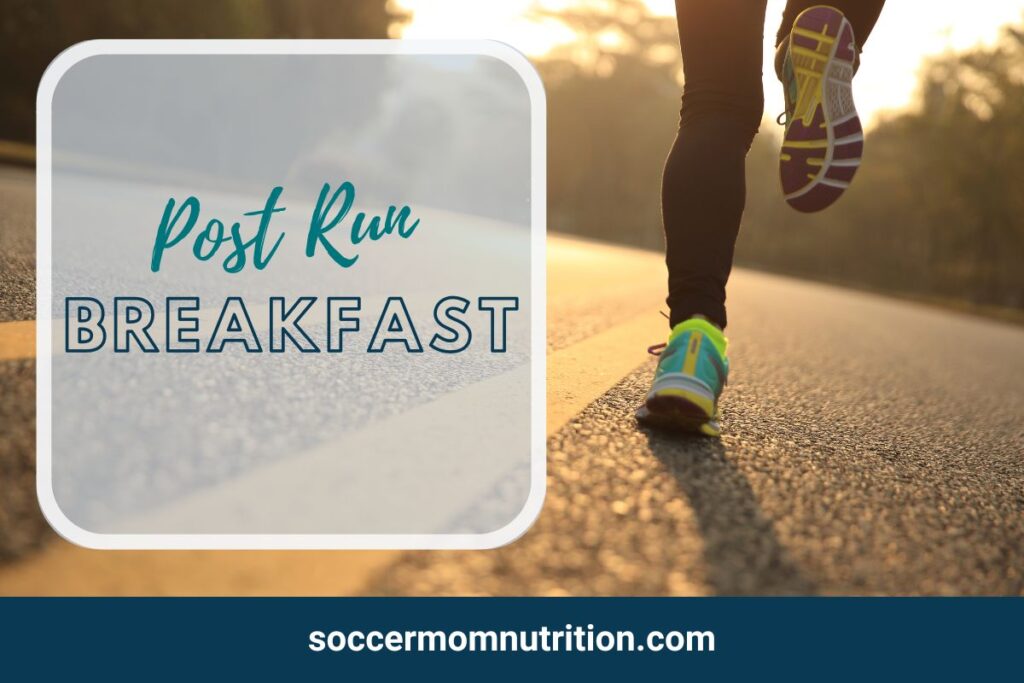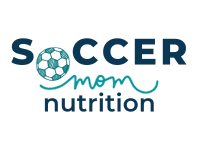Post Run Breakfast Tips to Refuel and Recover
You’ve just completed a challenging morning run, and you’re feeling great! But the work doesn’t stop there. Eating a post run breakfast is your next step.
Refueling and rehydrating after a run are crucial for your body to recover properly and for you to perform your best during your next run, game or practice.
After a morning run, your body needs to replenish the nutrients and fluids it has lost during exercise. Proper post run nutrition helps muscle recovery and rebuilding, as well as maintaining energy levels throughout the day.
In this post, we’ll cover the timing of meals, types of foods to eat, specific food recommendations, and the importance of rehydration after a run.

Please note that this article contains affiliate links. If you click one of these links and make a purchase, we may earn a commission.
Goals for post run breakfast recovery
The goals for recovery after a run include:
- Refueling muscle glycogen (energy) stores
- Repairing, building, maintaining muscle protein
- Rehydrating and replenishing fluids and electrolytes
- Promoting adaptations from exercise
- Supporting immune function
When to eat a post run breakfast
You’ll want to eat breakfast or a snack post morning run, especially if you didn’t eat before your run. Since your energy stores are emptied, you need to make sure you’re ready for your next run, practice or game.
Refueling your body by eating the right foods and drinking fluids within 30-60 minutes after your run helps to best support recovery. This is the time when your muscles are most receptive to nutrient absorption and can efficiently replenish muscle glycogen stores. (1)
However, not everyone is hungry right after a run or intense physical activity. If that’s the case, you should try to drink fluids that contain carbohydrates, electrolytes and protein if possible.
Then try to eat a regular meal shortly after. The exact timing and amount of food you eat right away can vary based on your preferences and needs. Use the performance plate method as a guide to meet your energy needs to refuel.
If you can’t get a real meal right away, you can pack a healthy snack, stash a gluten free protein bar in your bag or find a healthier snack or drink at a convenience store for a quick grab and go option.
What to eat after a morning run
Your post run breakfast should include a balance of carbohydrates, protein, and healthy fats to aid in muscle recovery and muscle protein synthesis and sustained energy. (2)
Here are some key nutrients to include:
Carbohydrates
Carbs help replenish glycogen stores in the body that have been depleted during exercise. Opt for complex carbohydrates such as whole grains, fruits and starchy vegetables to boost fiber, vitamins and minerals that can also reduce inflammation.
Even athletes who are eating a gluten free diet can find rich sources of gluten free carbs to replenish energy stores.
Great carbohydrate options include:
- Whole grain breads, bagels, english muffins, pita, whole wheat tortilla
- Oatmeal
- Overnight chia pudding
- High fiber cereal
- Granola
- Berries
- Bananas
- Potatoes
- Sweet potatoes
Vegetables
Vegetables, especially dark leafy greens like spinach and kale, are high in antioxidants like vitamins A, C, and E, which can help to reduce inflammation. Choose a variety of vegetables to add color to your plate.
Protein
Protein helps repair and rebuild muscle tissue that has been damaged during exercise and preserves lean muscle mass.
Choose lean protein sources such as:
- Eggs
- Low fat greek yogurt
- Beans
- Lean meats
- Plant based protein sausage
- Smoked salmon
- Nut butter
Healthy fats
Fats provide sustained energy and aid in nutrient absorption. Choose healthy fats such as avocado, nuts and seeds that also provide fiber.
Ideal Carbohydrate to Protein Ratio
When choosing recovery foods, you need a balance of carbohydrates and protein to refuel and recover after a run. Aim for a 3:1 ratio of carbohydrates to protein in your post-run breakfast.
This will help replenish glycogen stores and support muscle recovery. (2) .
Breakfast recommendations for post run
Here are some examples of post run breakfast meals and snacks to boost fiber, refuel energy stores and repair muscles:
- Overnight oats: Mix ½ cup of rolled oats with ¾ cup of almond milk or Greek yogurt, and let it sit in the fridge overnight. Top with fresh berries, chia seeds and chopped nuts for added flavor, carbohydrates and fiber boost.
- Avocado toast: Top a slice of whole grain toast with mashed avocado, sliced tomato and a scrambled or fried egg. Add a sprinkle of salt, za’atar spice and pepper. Serve with a side of fresh berries and dollop of yogurt.
- Smoothie bowl: Blend banana, frozen berries, low fat greek yogurt, almond butter and almond milk in a blender until smooth. Top with granola, hemp seeds and fresh mango.
- Breakfast burrito: Fill a whole grain tortilla with scrambled eggs, black beans, sliced avocado, salsa and tomato. Add a side of roasted potatoes and grapes.
- Protein pancakes or waffles: Mix 1 scoop of protein powder and add to dry ingredients for homemade pancake batter. Or mix up Kodiak brand protein pancake mix for a quick and easy option. Top with fresh berries and maple syrup or peanut butter or banana.
- Veggie omelet: Sautee spinach, mushrooms and sliced bell pepper Beat eggs with milk and pour over the vegetables. Cook until set, and fold in half. Serve with whole grain toast and fresh fruit.
- Low fat greek yogurt parfait: Layer low fat greek yogurt with mixed berries, granola, chopped walnuts and honey. Serve with a side of whole wheat toast and jam.
- Bagel and smoked salmon: Toast a whole wheat bagel and spread cream cheese, then top with smoked salmon, capers, chopped onion, tomato. Serve with a side of watermelon.
- Breakfast sandwich: Toast a whole grain english muffin and top with your favorite lean chicken sausage, fried egg, avocado and spinach. Add a side of mixed berries.
- Turkey sandwich on whole wheat: Make a turkey sandwich on whole grain bread with cheese, tomato and greens. Serve with a side salad.
- Leftovers: Heat up your favorite leftovers from the night before.
Hydration and replenishing electrolytes after a run
Rehydration is essential after a run to replace fluids lost through sweat. Drinking water is important, but depending on how much you sweat, you may also need to replenish electrolytes such as sodium, potassium and magnesium.
Focus on sodium which is the key electrolyte lost in sweat.
Electrolytes are important for fluid balance, muscle function and energy production. You can replenish electrolytes by drinking a sports drink or including a salty snack with water or another fluid like chocolate milk, coconut water or tart cherry juice.
Athletes should aim to drink around 20-24 oz of water following a run. Additionally if you are a heavy sweater, you may consider weighing yourself before and after your run.
Also, calculate your sweat rate loss to help you create an optimal hydration plan. You should drink 24 oz of water for every pound of weight lost.
This will ensure that you will be adequately rehydrated and ready to start your next exercise activity.
Conclusion
Refueling and rehydrating after a morning run is crucial for your body to recover and for you to perform your best on your next run.
Eat a balanced breakfast that includes complex carbs, protein, and healthy fats, and hydrate with water or electrolyte-rich drinks. With the right nutrition and hydration, you’ll be ready to tackle your next run with ease.
And you’ll also be ready for your next game.
Stephanie Magill, MS, RD, CD, FAND has over 22 years of experience in public health and nutrition. As a performance registered dietitian nutritionist, Stephanie specializes in sports nutrition and provides simple and actionable information so that athletes can be well fueled for high performance on and off the field. Stephanie has a Master’s Degree in Nutrition and is a Fellow of the Academy of Nutrition and Dietetics.

